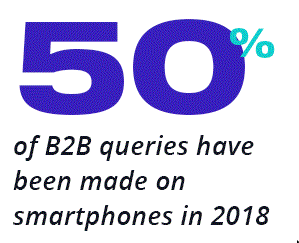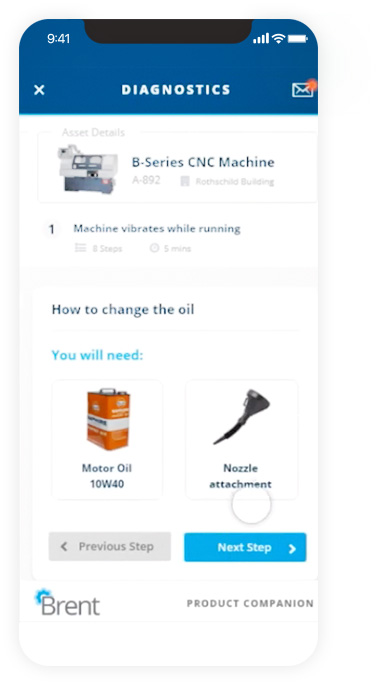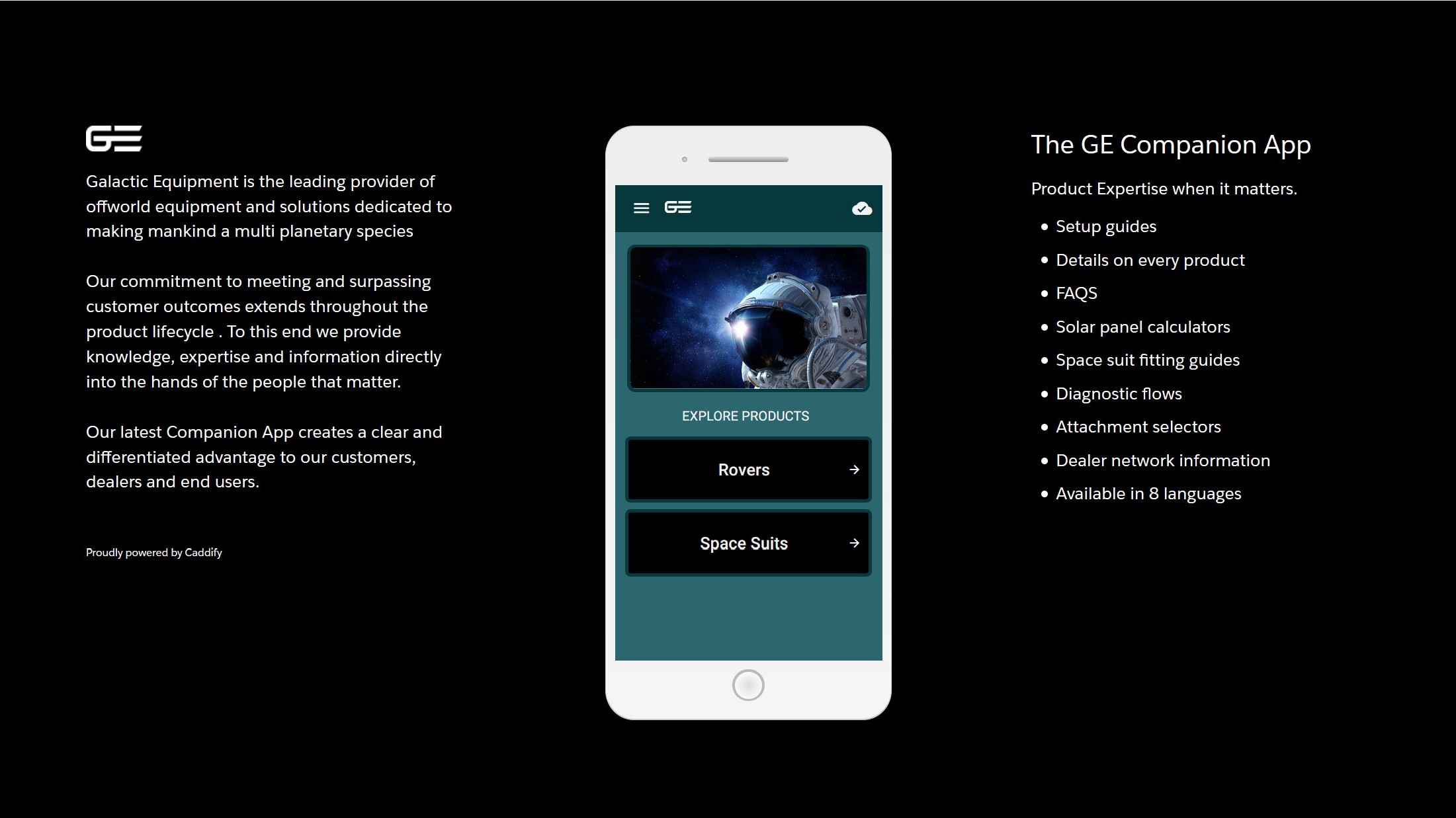

Manufacturers have always been judged on the quality, value, and reliability of their physical products. In today’s market there is now an increasing demand on superior digital experiences.
Mobile is not a choice, it’s a necessity
Over the last 10 years, mobile technology has significantly changed the way manufacturing companies provide customer service, support their partners, and compete in the market. Virtually everyone in that market now demands mobile customer service, with consumer-grade usability, to gain anytime access to information and support directly at the point of use of the product.

Unfortunately, manufacturers that are slow to act on this demand are jeopardising their survival. For example, 50% of B2B queries have been made on smartphones in 2018, and this is expected to rise to 70% by 2020. This technological shift is no longer a choice, it’s a necessity.
Customer trends are driving change
So why do manufacturers now require mobile as a core part of the customer service offering in today’s market? Firstly, thanks to the seamless mobile experiences provided by technology leaders like Amazon in the consumer space, it’s quickly becoming the default way all customers and partners are most comfortable interacting with other businesses.
Mobile customer service is fast, efficient, simple, convenient, personalised, and pervasive. All the same traits that make mobile apps such a necessity, and the ‘go-to’ method of engagement with consumer brands.

Additionally, Generation Z, raised using mobile technology, is now beginning to take up a large percentage of the global workforce. This means it will soon be the employers who have to adjust to the preferences of the majority, rather than the employees.
Manufacturers can empower their end users to work smarter, safer, and even experience products in a whole new way. Maximise asset uptime, maintain productivity, and increase lifetime value to your customers.
Justin Halfpenny
The role of the technology
The convergence of several trends can be identified as triggering the demand from both customers and the modern workforce, such as:
- The growing ubiquity of mobile devices in personal life.
- Eroding differentiation in quality of products from lower cost economies and producers has made support a key differentiator.
- The growing need to provide additional services for new revenue streams, often with higher margins.
- A maturing of the available technology platforms which provide manufacturers with integrated CRM and support functionalities.
- The availability of APIs to allow non-desktop access to those CRM and support systems.
- New mobile technologies and frameworks are allowing the blending of low-code and configuration with high degrees of customisation and branding.
A clear call to action is being sounded for manufacturers and suppliers to meet their customers’ expectations, and make mobile available as a core touch point to deliver a true omni-channel experience.
Over 90% of B2B buyers who report a superior mobile experience admit they’re likely to buy again from the same vendor, compared to only 50% of those reporting a poor mobile experience. It’s clear mobile technology is well on its way to becoming the primary way to ensure B2B customers are satisfied with their experience, due to the access to real-time interaction, research, order support, product service and maintenance, ecommerce, and much more.
Manufacturers can reap the rewards
In addition to fierce customer demands and other growing pressures, there are also a number of transformational benefits and advantages manufacturers are gaining by evolving to provide mobile customer service. These include:
- Competitive Differentiation – As mentioned previously, manufacturers must now go beyond their products to effectively stand out from the competition. The last 10 years have consequently seen customer service rise as a key differentiator, and mobile is becoming more and more important in achieving that.Customers who are able to resolve problems themselves will require less interaction with customer support and service teams.
Even if a customer does need to deal with those teams directly, the mobile application will give them more information and context, making the process far more streamlined.This gives the customers more up-time and better value from the products, increasing their trust in the manufacturer, and in turn boosts the confidence of their own customers as well. Using mobile to offer more than just a product, but mobile self-service at the point of use, is something many competitors will be unable to keep up with. - Customer Intimacy & Insights – Mobile naturally allows customers to get much closer to the business, thanks to the amount of data, personalisation, more frequent engagement, and anytime, anywhere availability. In the B2B space, where time and money are of immense value, this level of intimacy is now compulsory.
But these more intimate relationships also afford the business much deeper insights into what their customers want, as well as when, how, and why they want it.
By gaining an true understanding of their customers’ preferences, and providing those preferences in the form of service on a mobile device, directly from the pocket of the customer, manufacturers will improve even further. - Customer Satisfaction & Retention – Additionally, by giving customers product information at their fingertips to resolve issues themselves, or raise cases or service requests directly at the point of use, satisfaction levels will rise significantly.
Increases in customer satisfaction, of course, invariably lead to increases in customer retention. Mobile customer service can be a crucial driver of these benefits, which will result in greater financial performance and reduced costs.
This can be seen as a proven outcome in consumer customer behaviour, where good service and satisfaction both play a key role in the decision making process for repeat and add-on purchases, and nurture loyalty to brands that engage in the right ways.
Opening up the mobile channel, both self-service and in-app support, will then establish a natural foundation for manufacturers to build on for a wider strategy. All these things create significant advantages, such as reducing costs for the business, and attracting more revenue through outstanding support and customer service.
An example of success
One such business we have worked with to successfully move into to this fast-moving, complex way of staying relevant in today’s market is Biocomposites, Ltd.
Biocomposites is a leading manufacturer of calcium compound medical devices, designed to regenerate and repair bone and soft tissue. But Biocomposites has moved well beyond the one-dimensional model of simply producing those products.
Biocomposites worked closely with our team to launch a branded mobile app which allows their third-party distributors to become trusted and knowledgeable advisors.
Their distributors then use the Biocomposites companion app to place orders, access product information, guidance on usage, regulations, stock taking, pricing, direct support, in-app requests, and much more.
Why wait? Your customers won’t
The need to provide self-service at the point of use, with consumer-grade usability and enterprise-grade performance, is forcing manufacturers to venture well out of their comfort zone. But that’s a move that must be made if they are to survive among their competition, and ensure the service their customers receive is up to scratch.



